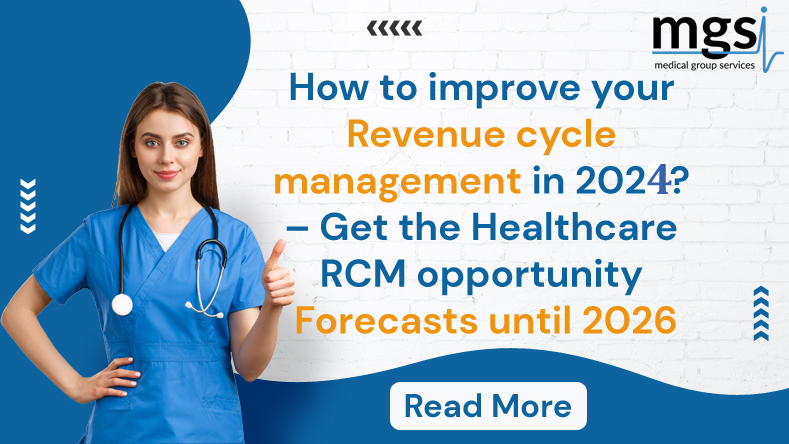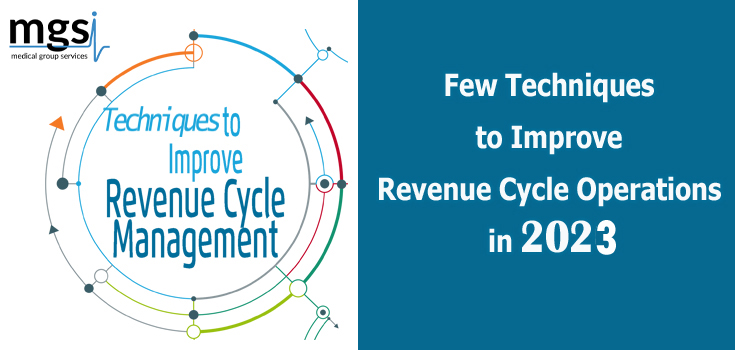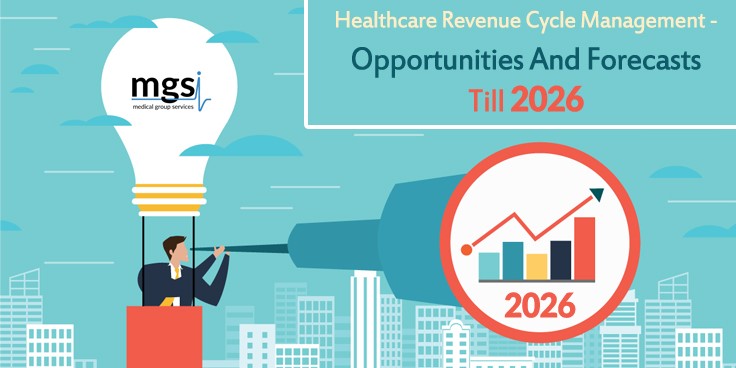
Revenue cycle management service
In any scope of work, there is always room for improvement. Revenue Cycle Management is the backbone of the healthcare industry and has continuous room for improvement with the ever-changing revision of Medical procedures, technological developments, and Insurance policies. The unceasing changes and updates in the healthcare industry and the revenue cycle management process require Providers, Medical staff, medical billers, and coders to be up to date to keep the physician’s practice and the billing process intact.

Revenue cycle management is not just about entering and submitting claims, an efficient revenue cycle management service starts right from the time the patient seeks an appointment and goes on until the physician rendering the service is reimbursed with the allowed amount successfully. The cycle includes step by step process of scheduling, Patient registration, Insurance eligibility, and benefits verification, Patient Demographics, Coding and Billing, Charge Entry, Claims submission, Payment Posting, AR follow-up, and Denial Management. Let us discuss in detail some key areas that can pull down your chances of a claim getting paid at the first submission and some tips to improve them.
A dedicated and Skilled Team of billers and Coders
To run the billing process effectively and productively, a dedicated team to handle each scope of service efficiently is indispensable. A skilled and experienced team of billers and coders can ensure reduced claims denials. A dedicated team of AR follow-up will ensure to bring back denied or lost revenue. On the whole, having an efficient team to handle the entire billing process is the key to keeping the cash flow unimpaired.
Insurance Eligibility and Benefits verification
Verification of each patient’s insurance coverage and benefits is vital as this information will help the provider communicate the patient’s responsibility during the first visit and handle the procedure suitably. Insurance policies and guidelines keep changing so it is important to know if the service to be rendered is covered under the patient’s current insurance policy. Similarly, it is also essential to be aware if the patient has paid his insurance due to avoid loss of payment. Research confirms that 90% of claims denials are because of rendering patient service without proper and accurate insurance information.
Denial Management
Neglecting denied and rejected claims can cause an unpredictable financial drain on your practice. Lack of proper insurance coverage, incomplete or inaccurate claims documentation, medical billing, and coding errors, incorrect charges or demographic entry, etc. are a few reasons for claim denials. Submitting cleaner claims and getting them paid at the first submission requires an experienced team of billers and coders who are updated with the constant changes in the billing process. An experienced and dedicated denial management team should be able to analyze your billing process and appeal for missed and lost revenue.
Utilizing Latest Technologies
To meet the demands of the changes in the Healthcare and Medical billing industry, the technological industry has been contributing various updated advancements to improve and ease revenue cycle management service. Choosing the right platform that suits your requirement will help smoothen your medical billing process.
Few Techniques to Improve Revenue Cycle Operations

Healthcare Revenue Cycle Management Operations include Medical Billing, Denial Management, and patient payment collections, etc. Through revenue cycle management, physicians can achieve faster and more accurate reimbursement. But in recent years, healthcare revenue cycle management is a difficult task due to various reasons such as
- Tangled payer contract
- Increased patient financial responsibility
- Increased Regulatory Demands
Let us discuss a few techniques to improve the revenue cycle operations in 2024 briefly.
Provide a Better Patient Financial Experience
For a better financial experience, physicians have to focus on improving price transparency and medical billing and collections. It does not only depend on price transparency but also on how the physicians interact with patients helping them to make financial decisions.
Supporting Technology to Optimize Workflow
Technology has come an unimaginably long way in recent years, and software tools help physicians improve revenue cycles that are popping up all over the place. For medical coding and billing purposes, choose the right technology solutions that evaluate the RCM performance quickly. If you wish to make a positive impact on your revenue cycle, then partner with a medical billing outsourcing company that also helps you to adopt innovative technology solutions. The healthcare system streamlines the revenue cycle operations (such as Days Sales Outstanding (DSO or A/R Days), Denial rate, Cash flow maximization, Clean Claim rate, etc.) by implementing supporting technology to optimize the workflow.
Revenue Enhancement through Predictive Analytics
The data-driven revenue cycle makes the decision-making task easier. Financial and clinical key performance indicators (KPI) need to be trailed. The health system’s revenue cycle pain points are identified and resolved by using the above-mentioned KPI factors. Through this process, the revenue cycle operations are getting improved.
Automate Prior Authorizations and Eligibility
For additional cost reduction, Payers focus on prior authorization and coverage eligibility requirements. However, it makes a problem for both practices and the hospital’s revenue cycle. Manual prior authorization is costlier than automated prior authorizations. For healthcare revenue cycles and clinical process optimization, automating prior authorization and eligibility verification processes is the best option. This process saves the staff time, and they are able to focus on other priority tasks like patient collection. It also helps the practices and hospitals to focus on cost savings.

The financial health of a healthcare organization is determined by the performance of the RCM (Revenue Cycle Management). It has become a huge challenge for Practices to keep the RCM from failing as the healthcare industry shifted from the fee-for-service model to value-based models like Alternative Payment Models (APM) and Self-pay in which patients take up more financial responsibility. These payment models have slowed down patient collections affecting the RCM. Other factors like improper medical billing and coding, claim denials, and AR pile-up have also impacted the RCM badly. Therefore, improving the RCM would be the key solution to streamlining a healthcare company’s finances. Let’s learn some tips on enhancing the RCM process:
Smart RCM:
Smart Revenue Cycle Management Software is the key to enhancing all the medical billing operations and improving the cash flow. It is also important that the staff are adequately trained so they can work on the software without any hassle. Right from patient registration to patient collections, everything can be streamlined through this software. Using this software, staff can easily verify patients’ insurance benefits, and eligibility, resolve outstanding balances, offer price estimation, and do much more. The software even prompts the staff on key things that needs immediate action, so there is no delay in any of the operations.
Periodical Auditing:
It is highly essential that healthcare organizations conduct periodic audits to track medical billing operations and collections. Proper AR management is ideal for better revenue generation. Therefore, the billing team should follow up on the aging account receivables and manage them prudently. Tracking payments from secondary and tertiary payers is very important as they may easily go unnoticed. To sum up, it is good to conduct frequent reviews and record the status to enhance the Revenue Cycle Management process.
Establish Payment Plans:
As discussed earlier, alternative payment models like Self-pay have imposed most of the financial responsibility on patients. In the past, healthcare organizations relied on insurance companies to pay, however, that situation has changed now. Henceforth, they have to depend on patients to collect payments. In that case, healthcare organizations should establish payment plans for all patients during the registration process. They should provide flexible payment options to pay and also educate the patients on their financial responsibility so they pay on time once services are provided. This way, RCM (Revenue Cycle Management) can be rationalized.
Outsource Medical Billing:
One of the best solutions to improve RCM (Revenue Cycle Management) is to outsource to experienced medical billing companies. These companies already come loaded with the right technology, software, and trained staff. Outsourcing doesn’t mean that it will completely replace a healthcare organization’s workforce. Hospitals will always have control and they can customize the services offered by medical billing companies as per needs. One of the advantages of outsourcing is that medical billing companies take care of all-payer negotiations to ensure better revenue generation. Also, they perform the aforementioned operations diligently.
Healthcare Revenue Cycle Management – Opportunities and Forecasts Until 2026
The advent of avant-garde technologies and leading-edge software systems has taken the healthcare revenue cycle management market’s growth to a whole new level. The adoption of Electronic Health Records (EHR), cloud-based solutions, and denial management fixes in almost every single Practice is another reason for this huge growth. A recent report named, ‘Revenue Cycle Management: Global Market Analysis, Insights and Forecast 2019-2026’ released by Research and Markets has come up with promising forecasts on healthcare revenue cycle management. Let’s delve deep into the forecasts and incredible opportunities that are in store for the revenue cycle management companies in the upcoming years:
Forecasts 2019 – 2026: According to the research andmarkets.com’s report, the size of the global healthcare revenue cycle management market is anticipated to reach approximately, 73.2 billion by 2026. Also, the CAGR is expected to rise to 12% in the service segment. There are immense growth opportunities for countries including, India, China, Singapore, and Japan during the suggested forecast period.
Research on Healthcare Revenue Cycle Management: Black Book, a US-based research firm surveyed over 522 hospitals for a study. According to the study results, 400 hospitals implemented revenue cycle management systems in the past six years. In addition, the results show that the remaining hospitals are planning to implement RCM systems as early as possible. Although, we can expect substantial growth in the market, implementing RCM systems is not an easy task as it involves the employment of trained staff and high deployment expenditures. To make it happen, partnering with experienced revenue cycle management companies would be a wise decision.
Other Key Forecast Findings:
- The report predicted that denial management services and account receivable management services would be the most outsourced functions.
- While cloud-based solutions rule the healthcare revenue cycle management market now, the web-based segment is expected to lead it in 2026.
- The fastest-growing segment would be the integrated solutions as it helps increase efficiency and productivity.
- As per 2018 status report, North America showed the highest CAGR. However, it is expected to change as the Asia Pacific followed by Latin America are fast-growing. They will show the highest CAGR by 2026.
- NextGen Healthcare, Quest Diagnostics, Inc; eClinicalWorks, Allscripts, Epic Systems, CareCloud Corporation, McKesson Corp; and Kareo, Inc are some of the key players operating in the healthcare revenue cycle management market.
Revenue Cycle Management Companies to the Rescue: According to another research conducted by the Healthcare Information and Management Systems Society (HIMSS), it is found that approximately 31% US healthcare organizations are still using traditional manual claims. To grow faster and as per the forecast predictions, it is good to get help from reputed medical billing companies who will implement high-end RCM systems and provide other IT solutions.
About MGSI:
One of the leading medical billing companies in the US, MGSI provides competitive RCM and other medical billing solutions to its clients. This Florida-based revenue cycle management company has been serving its clients varying from solo and group practices to radiology and anesthesiology groups for more than 20 years. It not only covers billing and collections, but also offer fee schedule evaluations, Document Management Systems (DMS), credentialing EMR solutions, and Mobile Charge Capture Solutions. To learn more details, log on to www.mgsionline.com.

